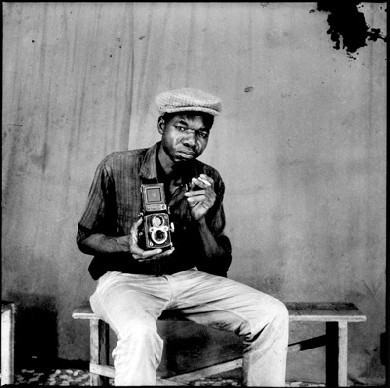Sean Jacobs's Blog, page 601
October 19, 2011
'Developing the First World'
You couldn't miss this trailer in front of The New School's West 12th Street building in the West Village last week:
The Ghana ThinkTank Mobile Unit is a custom-built teardrop trailer designed to journey into the so-called "First World," where it collects issues of concern from various local communities. The collected problems get sent to think tanks in Ghana, Cuba, El Salvador, Mexico, Serbia, Iran, Afghanistan and/or other countries, where strategies are developed. The trailer then rolls back into the previously visited communities, this time as a workstation, cooperating with community members to apply the strategies received from this global network of think tanks—whether they seem impractical or brilliant—for effected communities. Ghana ThinkTank thus reverses the customary flow of knowhow from "developed" to "developing" countries in playful and provocative ways.
Photo Credit: Amanda Ghanooni
 [image error]
[image error]






An opera village in Burkina Faso
Christoph Schlingensief's utopian vision for an opera village in Burkina Faso, where a stage, rehearsal space, school, hospital, hotel, church, and large communal kitchen, would be constructed for the community to produce work and live within was grand and commendable but as Kerstin Eckstein and Michael Schönhuth of [the German paper] Der Zeit see it, perhaps not fully planned through. The theoretical gesamtkunstwerk was initiated before the late Schlingensief's death and has since been taken on by his wife, Aino Laberenz. Yet it is struggling to meet the late artist's somewhat opaque vision. In March 2011, following FESPACO, the Goethe Institut organized a series of conversations in Ouagadougou about the project. Schönhuth and Eckstein point out that it may have been more beneficial to have representatives from neighboring villages or members of the local cultural scene rather than art experts and curators who knew Schlingensief. Furthermore, in a place with no tradition or concept of opera, but rather a tradition of suspicion towards bourgeois European cultural elites, it may be hard to find community support for the project. While Schlingensief was careful to avoid the clutches of neocolonialism through irony, self-accusation, and exaggeration, he also fell into the discourse of wanting to be healed and purified by what he called Africa's "purity and originality." Schönhuth and Eckstein acknowledge that this opera village has been conceived of in an entirely different way than Schlingensief's earlier projects, and that in these beginning stages of its construction and development it must work with a large network of local initiators and actors to sustain itself. However, they seem to see that this process is underway with the help and moderation of the Goethe-Institut. Only time will tell.
Source and Photo Credit.
 [image error]
[image error]






The Sudan Report
By Jonathan Faull*
It is just over 100 days since ICC indicted genocidaire Field-Marshall Omer Al-Bashir, President of the defunct Republic stood center-stage in Juba to be deliriously cheered by his erstwhile enemies. The world sighed at the relief of a relatively peaceful end to decades of conflict, death and displacement, and reveled in the promise of an independent South Sudan. It has been a short honeymoon.
Bereft of oil the north faces a chronic fiscal shock and a deep recession that could tear apart the remnants of Sudan. Government is yet to reconstitute itself since the departure of a third of the antebellum cabinet to the South's new government. And despite the need to draft a new Constitution to replace the "interim" document brought into being through the 2005 Comprehensive Peace Agreement, no process has been unveiled, and little progress has been made on building blocks of nationhood as basic as citizenship. Willful delusion, hubris and a recalcitrant leadership has left the country adrift with an unaccountable government largely paralysed amid steeply escalating food prices, and an acute and worsening dollar shortage.
Unsurprisingly, the populace is increasingly restive. At the periphery long-dormant secessionist conflicts trace the contours of a "new South" and have been met by a brutal onslaught by the Sudanese Armed Forces and their proxies. In the Nuba Mountains of South Kordofan estimates of citizens displaced this year by the aerial bombardments of villages run from 60,000 to 150,000. In Blue Nile antonov raids allegedly targetting civilian populations in order to cut supply lines to rebels have forced nearly 30,000 across the border into Ethiopia, while in the oil rich and disputed region of Abyei approximately 110,000 Dinka Ngok have been forced from their homes into South Sudan. Renewed and credible allegations of war crimes have stalled any rehabilitation the North could have expected to receive from the international community in return for the finalization of secession.
But it is in the cities that a new and – in the eyes of the regime – more disturbing trend is increasingly common: Ordinary citizens, and increasing numbers of the middle classes, are taking to the streets in centering on the crisis of diminished livelihoods eroded by inflation.
In January this year the self-immolation of a Tunisian street trader unleashed the long-oppressed voice of the Arab street across a swathe of MENA. Thus far, Khartoum has avoided contagion from the region, but with a 30% revenue reduction yet to filter through the state apparatus, and a three-year austerity budget targeting a 25% spending reduction yet to be implemented, significant pain is still to come. Watch this space.
* Jonathan Faull writes occasional posts for AIAC.
[image error]



 [image error]
[image error]


October 18, 2011
Music. Ghostpoet
Ghostpoet (government name: Obaro Ejimiwe) raps "in the bluesy, introspective tradition of Tricky and Roots Manuva". The video for his latest, "Liiines," came out last month. I actually prefer the video, above, and song for "Survive It," better.
[image error]



 [image error]
[image error]


Found Objects No. 15
Richard Pryor as Uganda's dictator Idi Amin Dada on his short-lived 1977 TV sketch comedy show on the American network channel, NBC.

 [image error]
[image error]

 [image error]
[image error]


Photography. Jean Depara
In Paris the Maison Revue Noire gallery presents a retrospective on the work of photographer Jean Depara. Born in Angola in 1928, Depara moved to Congo at a young age. After living and shooting in Léopoldville/Kinshasa for some years, his work was noted by music star Franco who asked him to become his official photographer. The resulting black and white pictures chronicling the city's night life in the fifties and sixties, the young Bills, the miziki and the sapeurs are, until this day, unmatched. Depara died in 1997, leaving his archive of hundreds of negatives untitled.
The exhibition runs until 17 December.
 [image error]
[image error]
 [image error]
[image error]
 [image error]
[image error]
 [image error]
[image error]
Guy Tillim and Adam Hochschild
Still catching up on on my summer stash. One of it is this video of a conversation at the Lannan Foundation (in Santa Fe, New Mexico) between South African photographer Guy Tillim (who has an extensive "African" oeuvre) and American writer Adam Hochchild (references: author, "King Leopold's Ghost;" Paul Kagame is a "the media savvy autocrat"). Watch it, like I did, when you're cleaning your desk.
Earlier at the same event Tillim talked about his photographs.
* More recently The Lanan Foundation also recently hosted a conversation between African writers Binyavanga Wainana (reference: "One Day I Will Write About This Place") and Chimamanda Adichie. Scroll down for the video.
 [image error]
[image error]






Children of Gorongosa
One of the photographs in a new series "Children of the Mountain" by academic and journalist Howard French. The children live in and near the Gorongosa National Park, Mozambique. French was there reporting a story on sociobiologist E.O.Wilson (now 82 years old) for The Atlantic. Wilson is working with an American billionaire, Greg Carr, and the Mozambican government to save the Gorongosa National Park, under stress during the civil war (more like proxy war by Rhodesia, South Africa and the United States) from 1976 to 1992 and since then by poachers and "locals setting fires to clear fields for farming and to smoke out wild edibles, from bushmeat to insect delicacies."
Here's French's description of the park:
… the only largely intact rain forest in all of Mozambique, a semitropical country roughly the size of Texas and Oklahoma. Solitary and broad-shouldered, the mountain rises more than 6,000 feet above the surrounding plains, providing a local climate unlike any other for hundreds of miles around it. It draws its water from the warm, moist winds that blow in from the nearby Indian Ocean, kissing its cool upper flanks and sustaining a unique ecosystem of rare orchids, mountain cypress, and rich bird life like the green-headed oriole, along with any number of other species yet to be identified.
Here's the full set.
[image error]





 [image error]
[image error]
'Let's pray that this is one bit of culture that won't make it out of Africa'
I just came across these videos: Number 13 in a humorous–and of course very ethnocentric–series of Youtube videos made in the UK entitled "World Cup 2010 Most Shocking Moments."
[image error] [image error]






October 17, 2011
Music Break. Nkunkuma
Cameroon ('Kamer') hip hop is churning out lots of videos lately. Like this one by Nkunkuma. A nice track, if you make it past the intro.
[image error]

 [image error]
[image error]

 [image error]
[image error]

Sean Jacobs's Blog
- Sean Jacobs's profile
- 4 followers







